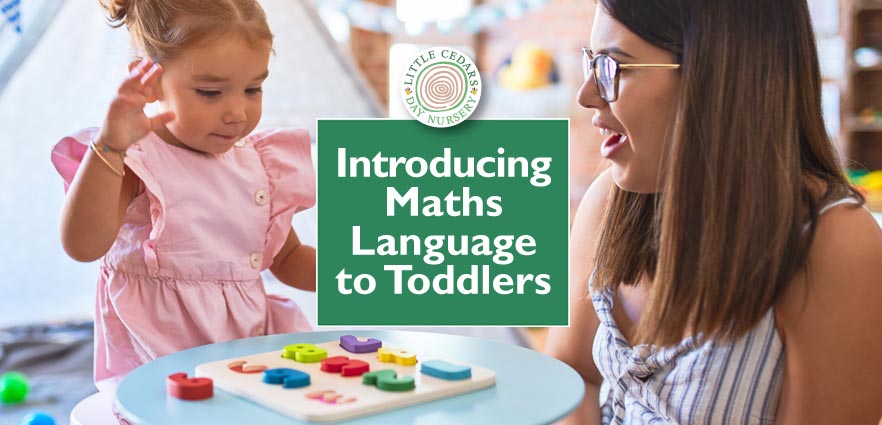
Mathematics is an essential part of everyday life and an understanding of basic maths concepts is crucial for success in virtually all walks of life. 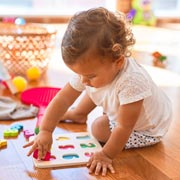 However, many children struggle with maths and have negative attitudes towards the topic. To prevent this, it is important to introduce maths concepts and vocabulary to children at a young age. Fortunately toddlers are at a period of development where they can learn and understand a range of maths words and concepts when given the opportunity. And, by introducing mathematical concepts and vocabulary to toddlers in a fun and engaging way, adults can help children develop a strong foundation in maths and foster a positive attitude towards the subject.
However, many children struggle with maths and have negative attitudes towards the topic. To prevent this, it is important to introduce maths concepts and vocabulary to children at a young age. Fortunately toddlers are at a period of development where they can learn and understand a range of maths words and concepts when given the opportunity. And, by introducing mathematical concepts and vocabulary to toddlers in a fun and engaging way, adults can help children develop a strong foundation in maths and foster a positive attitude towards the subject.
In today’s article, we will explore why it is important to introduce maths language and concepts to toddlers, how parents/caregivers can help those toddlers learn and understand them, and which specific maths-related words can be successfully introduced at this young age. We will also suggest some activities that parents can use to help their toddlers develop a good maths vocabulary.
What Type of Maths Words can Toddlers Learn?
Toddlers can learn and understand a range of maths words and concepts even at their young age. Here are some examples:
Number words
Toddlers can, of course, learn to recognise and say the names of numbers, such as one, two, three, and so on.
Counting concepts
Toddlers can understand the concept of counting i.e. learn to count objects such as toys etc.
Size words
Toddlers can learn to recognise and say size-related words, such as big, small, tall, and short. These all have their root in maths.
Shape words
Toddlers can also learn to recognise and say the names of shapes, which have their root in mathematics. For example, squares, triangles, circles, and rectangles.
Positional words
Toddlers can learn positional words, which again have a kind of root in maths, such as up, down, in, out, on, and off.
Comparatives
Toddlers can learn comparative words such as more, less, equal, the same, and different.
Measurement words
Toddlers can learn measurement-related words such as long, short, heavy, light, full, and empty.
Time words
Toddlers can also learn time-related words such as now, later, early, and late.
The important thing about learning maths words and vocabulary during day-to-day activities is that children don’t even know that they’re learning maths concepts — it comes naturally when nurtured as part of everyday life.
Why Introducing Maths Words to Toddlers is So Important
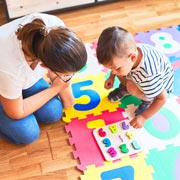 Introducing maths words and language to toddlers is all part of the EYFS curriculum at nurseries like Little Cedars and is important for several reasons:
Introducing maths words and language to toddlers is all part of the EYFS curriculum at nurseries like Little Cedars and is important for several reasons:
It helps develop strong foundations. Introducing maths language to toddlers helps to develop a strong foundation for mathematical concepts that they can build on more fully later on. For example, when toddlers start hearing words such as “one,” “two,” “count,” “more,” and “less,” they begin to develop a basic understanding of numbers, maths concepts and the real world use of counting.
It enhances problem-solving skills. Maths involves problem-solving, and introducing maths-related words and concepts to toddlers helps them develop these problem-solving skills right from an early age. For example, as toddlers learn to count, they also learn to recognise patterns in nature and objects around them. Identifying these patterns is one of the first steps towards developing problem-solving strategies.
It improves language skills. Introducing maths-related language to toddlers can also help improve their language skills, expanding both vocabulary and their ability to communicate effectively. That is incredibly important.
It prepares under-fives for school. Introducing maths words and language to toddlers will also help to prepare them better for when they start school. Once they start, they will already be familiar with the language around mathematics and numeracy and will therefore have a head start in understanding the more advanced maths concepts that school lessons will introduce.
Early maths skills in preschool, such as counting and recognising numbers, are strong predictors of later maths achievement and can help improve maths skills in the long term.
So, as well as helping to lay the foundation for a strong understanding of mathematics itself, introducing maths words and language to children when they’re toddlers helps them develop important additional skills that will benefit them throughout their lives.
How to Help Toddlers Learn Maths Language
 Parents and caregivers can help toddlers learn maths words and maths-related language in a variety of ways. General examples include:
Parents and caregivers can help toddlers learn maths words and maths-related language in a variety of ways. General examples include:
Counting objects; parents can encourage toddlers to count objects such as their own fingers and toes, toys, blocks, things in nature or even food items. This will help toddlers develop counting skills and help them start to understand the concept of numbers and what they mean in day-to-day life.
Reading books; parents can read toddlers books that will introduce maths concepts and vocabulary to them. There are many, many age-appropriate books available that use fun and engaging stories in order to teach basic maths concepts.
Singing songs; singing songs that involve counting and numbers can be a fun and interactive way for toddlers to learn maths-related words and language. Parents can even perhaps try to make up their own songs or rhymes to reinforce any specific maths concepts that they want to highlight to the child.
Playing games; parents can also play games with toddlers that involve counting, sorting, or perhaps even matching or comparing objects (some activity ideas follow below). These types of games reinforce maths vocabulary and can also help children develop problem-solving skills.
Using real-life situations; parents can use real-life situations such as cooking, tidying up or grocery shopping to introduce maths concepts and vocabulary to toddlers. For example, parents can ask toddlers to count the number of apples they need for a recipe, ask them to help sort items in the grocery basket, or count how many socks (or pairs of socks) are hanging on the washing line.
Incorporating maths words and language into everyday play and activities can really help toddlers learn and understand basic maths concepts in a fun and engaging way, without them perhaps even realising that they’re being taught mathematics per se.
Activity Ideas
Here are some more specific activity ideas that can help toddlers develop an understanding of maths concepts and vocabulary in a fun and engaging way:
Shape Hunts
Parents can go on a shape hunt with their toddlers, looking for shapes in the environment such as circles, squares, and triangles. If more than one child is involved, perhaps it could be developed into a competition with prizes. This activity can help toddlers learn the names of shapes and develop visual-spatial skills.
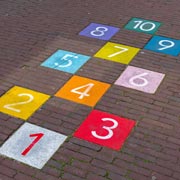 Number Hopscotch
Number Hopscotch
Parents can create a hopscotch game using numbers. Toddlers can practise jumping on the numbers and the adult can encourage them to say the numbers out loud. This will help them develop number recognition and counting skills.
Measurement Activities
Parents can engage toddlers in measurement activities such as pouring water into different size containers or comparing the length of different objects. These activities can help toddlers understand measurement concepts and vocabulary such as volume, height, and length.
Pattern Recognition
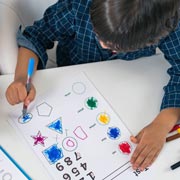 Parents can create simple patterns using objects such as blocks, toys, or coloured pencils, and ask toddlers to continue the pattern. This activity can help toddlers develop their pattern recognition skills and understand basic maths concepts such as repetition and sequencing.
Parents can create simple patterns using objects such as blocks, toys, or coloured pencils, and ask toddlers to continue the pattern. This activity can help toddlers develop their pattern recognition skills and understand basic maths concepts such as repetition and sequencing.
Sorting Activities
Parents can provide toddlers with a variety of objects and ask them to sort them based on different attributes such as colour, size, or shape. This activity can help toddlers understand basic maths concepts such as classification and sorting.
Building Activities
Parents can provide toddlers with building blocks or other construction toys and encourage them to build structures using different shapes and sizes. This activity can help toddlers develop spatial reasoning and understanding of geometry.
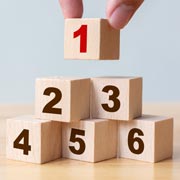 Introducing maths words and concepts to toddlers is an important step in fostering their overall learning and development as well as in relation to success in mathematics itself. By teaching toddlers maths vocabulary and concepts at a young age, we can help them develop strong foundations in maths, enhance their cognitive development and language skills, and improve their attitudes towards maths. It is never too early to start introducing maths concepts to children, and by doing so, we can help them develop a lifelong appreciation of maths as well as nurturing a strong foundation for future success in many areas of their lives.
Introducing maths words and concepts to toddlers is an important step in fostering their overall learning and development as well as in relation to success in mathematics itself. By teaching toddlers maths vocabulary and concepts at a young age, we can help them develop strong foundations in maths, enhance their cognitive development and language skills, and improve their attitudes towards maths. It is never too early to start introducing maths concepts to children, and by doing so, we can help them develop a lifelong appreciation of maths as well as nurturing a strong foundation for future success in many areas of their lives.
Nursery & Pre-School Places in Streatham, London SW16
A Nursery Place for Your Child in Streatham

 Little Cedars Nursery in Streatham invites parents of babies, toddlers and children under five to apply for a childcare place at the setting. We offer high quality childcare on weekdays, virtually throughout the entire year, and give little ones the very best start a child could ever ask for. As well as being somewhere to look after your child, we also nurture their learning and development, giving them a full early years education. We have a good Ofsted rating.
Little Cedars Nursery in Streatham invites parents of babies, toddlers and children under five to apply for a childcare place at the setting. We offer high quality childcare on weekdays, virtually throughout the entire year, and give little ones the very best start a child could ever ask for. As well as being somewhere to look after your child, we also nurture their learning and development, giving them a full early years education. We have a good Ofsted rating.
Come along to see for yourself — we’ll give you and your child a guided tour, answer any questions and you can see for yourself how well your little one will fit in. Please choose an option below to make contact, request a tour or to apply for a nursery/pre-school place and we’ll be delighted to help:
Little Cedars Nursery is located in Streatham, near Streatham Hill, Streatham Park, Streatham Common, Furzedown, Tooting, Tooting Bec, Tooting Broadway, Tooting Common, Balham, Norbury and Colliers Wood.


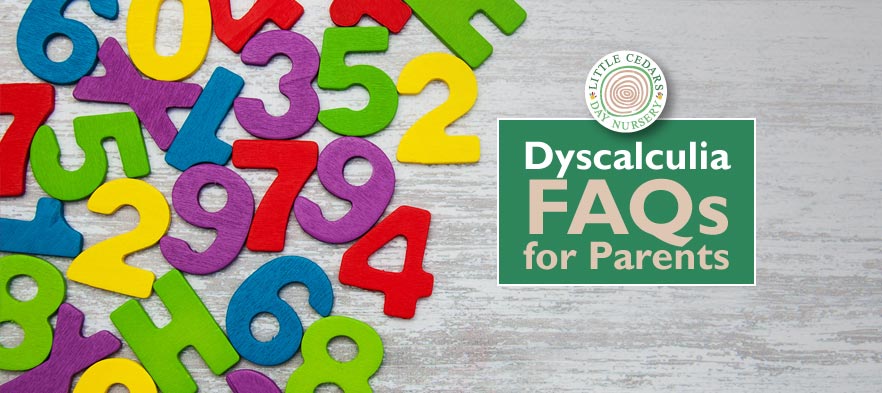
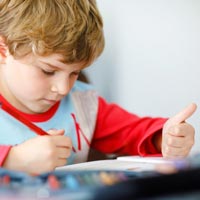 In today’s guide, we answer frequently asked questions (FAQs) about Dyscalculia, particularly in relation to children, including preschoolers. Around 5% of children of school age are thought to have dyscalculia.
In today’s guide, we answer frequently asked questions (FAQs) about Dyscalculia, particularly in relation to children, including preschoolers. Around 5% of children of school age are thought to have dyscalculia.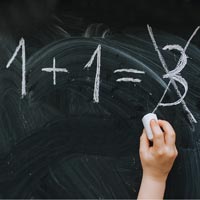 A few of the possible signs of dyscalculia include:
A few of the possible signs of dyscalculia include: They may also continue to use fingers to count long after their contemporaries have moved on to mental counting;
They may also continue to use fingers to count long after their contemporaries have moved on to mental counting; Just as with dyslexia, there is no cure for dyscalculia. However, there are many ways to help children cope with its effects. It’s also worth bearing in mind that children with dyscalculia can be very gifted in other areas, for example creativity, strategic thinking, problem solving, practical abilities and often great intuition.
Just as with dyslexia, there is no cure for dyscalculia. However, there are many ways to help children cope with its effects. It’s also worth bearing in mind that children with dyscalculia can be very gifted in other areas, for example creativity, strategic thinking, problem solving, practical abilities and often great intuition.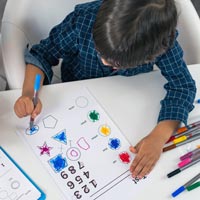 They can also benefit when important words and numbers are highlighted (to draw attention to their importance);
They can also benefit when important words and numbers are highlighted (to draw attention to their importance);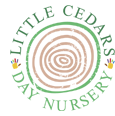 Childcare professionals at Little Cedars Nursery will look out for possible signs of dyscalculia — and any other learning difficulties — as a matter of course. If we spot anything, we’ll liaise with parents, guardians or carers to discuss ways in which we can all help, together. There are many ways to help children with learning difficulties. That’s true whether they’re at the nursery, at home, or when they are ready to move on to school. Helping children with challenges and any special educational needs is all part of the service at Little Cedars Nursery, Streatham. Indeed, one of our main goals is to help each child become the very best version of themselves.
Childcare professionals at Little Cedars Nursery will look out for possible signs of dyscalculia — and any other learning difficulties — as a matter of course. If we spot anything, we’ll liaise with parents, guardians or carers to discuss ways in which we can all help, together. There are many ways to help children with learning difficulties. That’s true whether they’re at the nursery, at home, or when they are ready to move on to school. Helping children with challenges and any special educational needs is all part of the service at Little Cedars Nursery, Streatham. Indeed, one of our main goals is to help each child become the very best version of themselves.